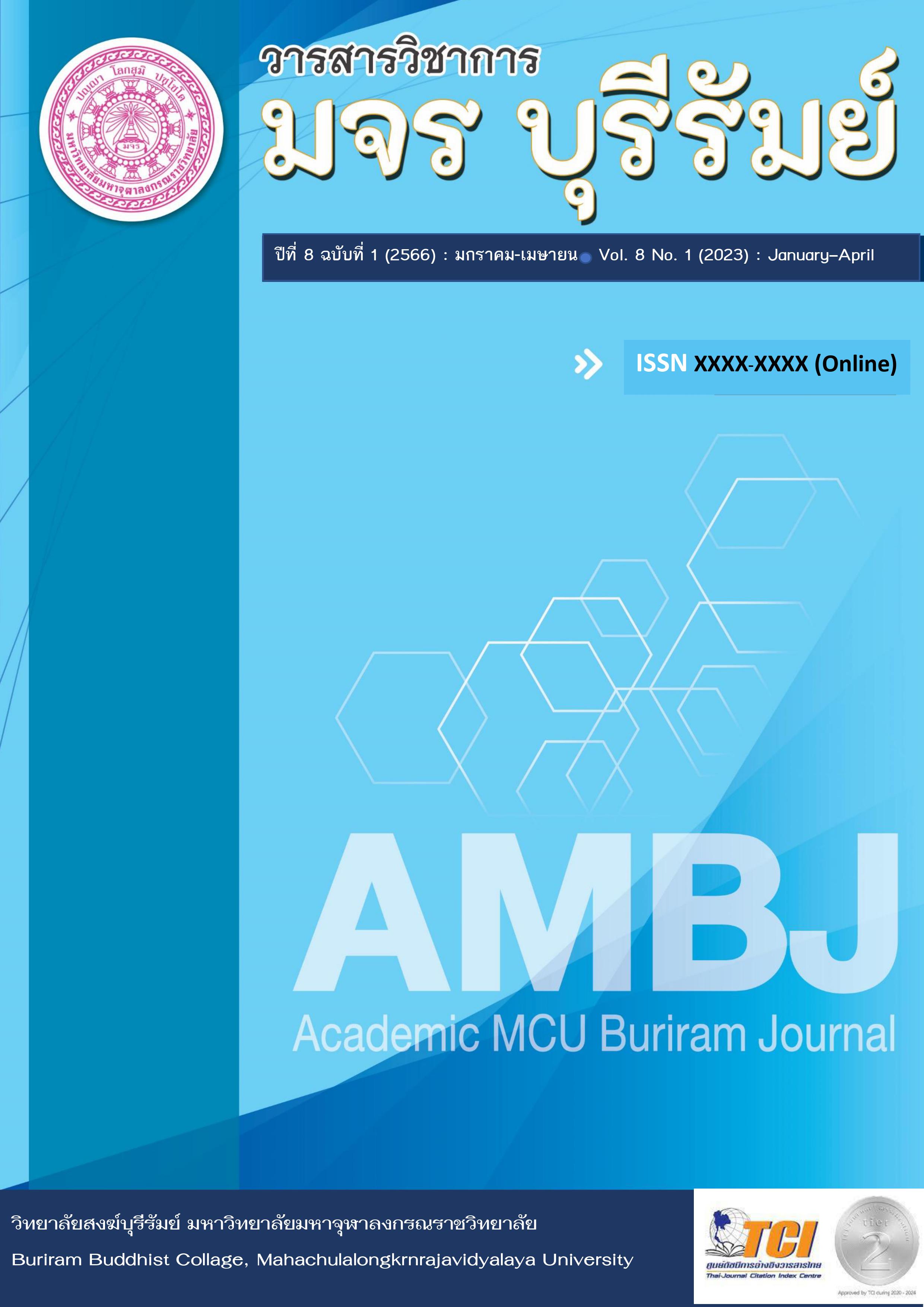A Comparison of the Social Studies Learning Achievement of Matthayomsuksa 1 at Thammasartklonglungwittayakom School using Problem-based Learning Approaches and Traditional Methods
Keywords:
Problem-based Method, Comparison, Traditional MethodsAbstract
The purposes of this research were: 1) to compare students’ achievement before and after the experimental group using the method of problem-based learning, 2) to compare students’ achievement before and after the control group using the method of traditional, 3) to compare the academic achievement using the method of problem-based learning and the method of traditional, 4) to study students' satisfaction with learning management with problem-based learning. Using the simple random sampling method, the researcher selected a research population consisting of Mathayomsuksa 1 student class 4 and 7 enrolled at Thammasartklonglungwittayakom School, Klongluang district, Pathumthani province, in the first semester of the academic year 2022. The research instruments consisted of (1) PBL. method lesson plans (2) Traditional methods lesson plans (3) An academic achievement test (4) form used to measure satisfaction with social study using the PBL method of instruction. Using techniques of descriptive statistics, the researcher analyzed the data collected in terms of mean and standard deviation. The instruments of research were tested for reliability by the researcher. In addition, the researcher employed both the dependent and Independent t-test technique in subjecting the data collected to further analysis.
The research results found that:
1. The posttest scores of experimental group showed higher than the pretest scores. Statistically significant level of 0.05.
2. The posttest scores of control group showed higher than the pretest scores. Statistically significant level of 0.05.
3. The learning achievement of the students by means of problem-based teaching method showed a higher mean than that of the students under traditional teaching method at the statistically significant level of 0.05.
4. The satisfaction with science study of the students instructed by the problem-based method was evinced at the highest level.
References
กนกวรรณ ไกรสุทธิ์. (2558). การเปรียบเทียบผลสัมฤทธิ์ทางการเรียนวิทยาศาสตร์ระหว่างการจัดการเรียนรู้โดยใช้ปัญหาเป็นฐาน (PBL) กับการจัดการเรียนรู้แบบปกติของนักเรียนชั้นประถมศึกษาปีที่5 โรงเรียนบ้านย่านตาขาว จังหวัดตรัง. วิทยานิพนธ์ ศษ.ม. กรุงเทพฯ: มหาวิทยาลัยรามคำแหง.
กระทรวงศึกษาธิการ. (2560). หลักสูตรแกนกลางการศึกษาขั้นพื้นฐาน พุทธศักราช 2551 (ฉบับปรับปรุง 2560). กรุงเทพฯ: โรงพิมพ์คุรุสภา ลาดพร้าว.
ชไมพร เลากลาง, วาสนา กีรติจำเริญ, และ วิราวรรณ์ ชาติบุตร. (2558). การศึกษาผลสัมฤทธิ์ทางการเรียน หน่วยการเรียนรู้พืชมีการตอบสนองและความสามารถ ในการแก้ปัญหาของนักเรียนชั้นประถมศึกษาปีที่ 4 จากการจัดการเรียนรู้โดยใช้ปัญหาเป็นฐาน. การประชุมวิชาการและการนำเสนอผลงานวิจัยระดับชาติและนานาชาติ ครั้งที่ 2 “การเชื่อมโยงและบูรณาการระหว่างศาสตร์ระดับบัณฑิตศึกษา” ของมหาวิทยาลัยราชภัฏนครราชสีมา. นครราชสีมา.
นิสา นามเดช. (2558). การเปรียบเทียบผลสัมฤทธิ์ทางการเรียนและความสามารถในการแก้ปัญหาทางวิทยาศาสตร์ เรื่อง แรงและการเคลื่อนที่ กลุ่มสาระการเรียนรู้วิทยาศาสตร์ ชั้นมัธยมศึกษาปีที่ 3 ระหว่างการจัดกิจกรรมการเรียนรู้โดยใช้ปัญหาเป็นฐาน (PBL) กับการจัดกิจกรรมการเรียนรู้แบบปกติ. วิทยานิพนธ์ปริญญามหาบัณฑิต. มหาวิทยาลัยราชภัฏชัยภูมิ.
ภูวนาท พูนสวัสดิ์. (2559). การเปรียบเทียบทักษะการแก้ปัญหาและผลสัมฤทธิ์ทางการเรียนในรายวิชาประวัติศาสตร์ระหว่างนักเรียนที่เรียนด้วยการจัดกิจกรรมการเรียนรู้โดยใช้รูปแบบการสอน PBL(PROBLEM – BASED LEANING) ร่วมกับการใช้โปรแกรม DBOOK PRO กับห้องเรียนปกติของนักเรียนชั้นมัธยมศึกษาปีที่ 6. วิทยานิพนธ์ปริญญาศึกษาศาสตรมหาบัณฑิต สาขาวิชาหลักสูตรและการสอน. บัณฑิตวิทยาลัย: มหาวิทยาลัยขอนแก่น.
วิภาพรรณ พินลา และวิภาดา พินลา. (2561). การจัดการเรียนรู้สังคมศึกษาในยุคศตวรรษที่ 21. กรุงเทพฯ: สำนักพิมพ์แห่งจุฬาลงกรณ์มหาวิทยาลัย.
สุไม บิลไบ. (2558). สมรรถนะ ทักษะและบทบาทของครูไทยในศตวรรษที่ 21. เอกสารประกอบการเรียนรายวิชานวัตกรรมและเทคโนโลยีสารสนเทศ: บทบาทครูในยุคเทคโนโลยีสารสนเทศ. กรุงเทพฯ: วิทยาลัยฝึกหัดครู มหาวิทยาลัยราชภัฏพระนคร.
Downloads
Published
How to Cite
Issue
Section
License
Copyright (c) 2023 Academic MCU Buriram Journal

This work is licensed under a Creative Commons Attribution-NonCommercial-NoDerivatives 4.0 International License.
ทัศนะและความคิดเห็นที่ปรากฏในบทความวารสารฉบับนี้ถือเป็นความรับผิดชอบของผู้เขียนบทความนั้น ไม่ถือเป็นทัศนะและความรับผิดชอบของบรรณาธิการ





